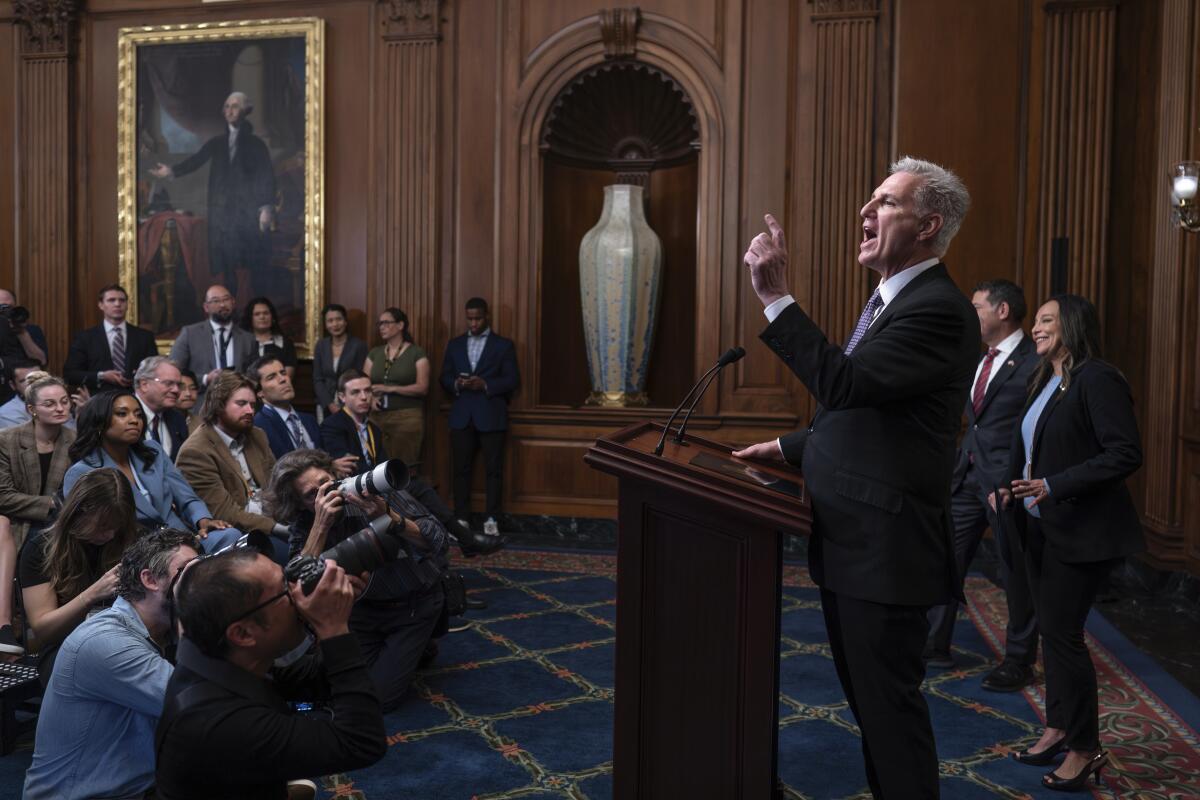Matt Gaetz moves to oust Kevin McCarthy from speakership

Rep. Matt Gaetz moved late Monday to oust Kevin McCarthy as speaker of the House. He has said the Bakersfield Republican had betrayed the GOP by reaching a deal with Democrats over the weekend to avert — for now — a government shutdown.
Under current rules, any House member may force a vote to remove the speaker. Gaetz (R-Fla.) filed such a motion Monday evening. Chamber rules require McCarthy to act on Gaetz’s motion within two days. A simple majority vote can remove him from the speakership.
The outcome of any vote to remove McCarthy remains uncertain and will depend on whether other Republicans vote against him. He can afford to lose only a handful of Republican votes, assuming all Democrats vote against him.
Speaking on steps of the U.S. Capitol, Gaetz said he has enough votes to either remove McCarthy as speaker or force him to cut a deal with Democrats to survive. “I’m at peace with either result because the American people deserve to know who governs them,” Gaetz told reporters.

Shortly after Gaetz filed, McCarthy tweeted, “Bring it on.”
Gaetz replied, “Just did.”
Ever since becoming speaker with a narrow majority, McCarthy has been hamstrung by the conservative wing of his party, showcasing his weakness as a leader. He’s repeatedly failed to unify his party and has repeatedly turned to Democrats to bail him out of crises. In May, a minority of Republicans and a majority of Democrats voted to back McCarthy’s deal with President Biden, which suspended the nation’s debt limit in order to avoid the cataclysmic economic fallout of a debt default.
In September, a handful of Republicans repeatedly blocked multiple spending bills McCarthy had hoped to pass to keep the federal government open. The speaker had aimed to present a united Republican front to the Biden administration and the Democratic-controlled Senate in order to boost his party’s position in shutdown negotiations. Gaetz and his allies made that impossible.
Congress has voted to prevent a government shutdown. But House Speaker Kevin McCarthy had to rely on Democrats to get the bill to President Biden’s desk.
At the last minute, McCarthy relied on Democratic votes to send the upper chamber a bipartisan stopgap measure that extended government funding through mid-November. The legislation did not include military aid for Ukraine, a key sticking point for some Republicans whose constituents are growing increasingly worried about the United States’ repeated investment in Ukraine’s war with Russia.
Biden in August asked Congress to send Ukraine an additional $24 billion in aid, saying Kyiv risked defeat if military funding lapsed. Biden and House Democratic leadership said they expected McCarthy to keep his commitment to Ukraine.
In a Monday floor speech, Gaetz alleged McCarthy inked a “secret side deal” with Democrats to hold a House vote on Ukraine funding in exchange for getting enough votes to prevent a shutdown. McCarthy denied making any deals with Democrats, saying he hasn’t spoken with Biden for months.
McCarthy’s hold on the speakership has been tenuous from the start. He needed 15 tries to clinch enough Republican support to claim the speaker’s gavel. In exchange for the support of far-right members, he agreed to restore chamber rules that make it easy for any lawmaker to force a vote to remove him from his post.
Because Republicans’ House majority is so slim, even small groups of GOP lawmakers can vote with Democrats to prevent McCarthy from advancing his agenda. Hard-line House Republicans have used this leverage to force him to accede to various demands, including opening a formal impeachment inquiry into Biden.
The impeachment effort, championed by former President Trump, has been met with skepticism — not only from Democrats but also from legal experts and some Republicans, who say the GOP does not have hard evidence to prove “high crimes and misdemeanors,” the constitutional bar to remove Biden from the White House.
On Monday, as Gaetz threatened a coup, many GOP lawmakers publicly backed McCarthy. Hours before Gaetz filed his motion, Rep. Tom McClintock (R-Elk Grove) criticized his party’s civil war, saying the “immediate effect will be to paralyze the House indefinitely” as the chamber is working to cut a deal with the Senate to fund the government beyond mid-November.
“The supreme irony is that this is being initiated by self-described conservatives,” he said, alluding to Gaetz. “Do they honestly believe that when the Democrats side with them to remove a Republican speaker that they will then side with them to name a more conservative replacement? Of course not.”
Rep. Marjorie Taylor Greene (R-Ga.), a far-right lawmaker and self-proclaimed friend of Gaetz, also said she would oppose ousting McCarthy. “Republicans need to get off the power trips, stop the absurd drama, remember who the enemy is, stop fighting with each other, and get serious about solving the problems that produce annual systemic failure,” she wrote on X, formerly Twitter.
If Gaetz has the votes he claims to have, McCarthy will need Democrats to again bail him out.
Rep. Jimmy Gomez (D-Los Angeles) said he would not help the Republican leader.
“I’d love to see McCarthy gone,” Gomez told The Times on Monday night. “I don’t care who replaces him.” Gomez said he would also block any attempt by McCarthy to delay a floor vote on his removal and would back his party’s leader, Rep. Hakeem Jeffries of New York, for the speakership.
“Voting to save McCarthy means that you’re OK with what he does,” he said. “And I’m not OK with what he does.”
More to Read
Get the L.A. Times Politics newsletter
Deeply reported insights into legislation, politics and policy from Sacramento, Washington and beyond. In your inbox three times per week.
You may occasionally receive promotional content from the Los Angeles Times.







